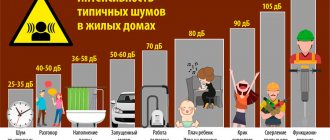Causes of noise from a neighboring apartment
The causes of noise can be completely different:
- Loud music.
- Repair work.
- Screams.
- Whistling.
- Singing.
- Playing musical instruments.
- Loud knocking, rustling, grinding.
It is necessary to distinguish between systematic noises, which can be generated by people or equipment at any time of the day, and loud sounds at night. The legal difference between them is that systematic noise is a violation of sanitary standards, and loud noises at night are a violation of administrative legislation.
Accordingly, neighbors need to act depending on the specific situation. Questions about regular violation of silence by devices and citizens during construction and road work, as a result of the activities of public catering organizations, the functioning of public transport, etc. fall within the competence of Rospotrebnadzor.
As for sharp sounds made at night (loud music, screams, whistling, singing, the use of pyrotechnics, repairs at neighbors' houses, etc.), these are offenses that police officers have the right to record. As for the consideration of cases of administrative offenses, the powers are vested either with internal affairs officers or administrative commissions.
If the neighbors are making noise while doing repairs
Carrying out renovation work in an apartment often becomes a stumbling point. By performing actions at set hours, a person is sincerely confident that he is not violating anything. However, loud noise can significantly disturb other residents.
In this situation, the law has not really been broken. An anonymous complaint will not be approved.
In this situation, you can try to appeal to the conscience of the neighbor below or above. If a person is reasonable, he will try to coordinate the hours of work with other residents of the building in which the apartment is located and not disturb them on weekends.
Video
How to measure noise level
To measure noise, special instruments called sound level meters are used. Noise can also be measured using special computer programs. Today there are even mobile phone apps that measure noise levels. Measurements made by non-professionals can only indicate that the noise level is exceeded, but the readings of such devices cannot serve as evidence in court.
If the noise in an apartment is systematically excessive, its residents need to seek professional help from specialists from Rospotrebnadzor (it is this authority that is empowered to monitor compliance with sanitary standards and rules).
Rospotrebnadzor specialists will measure the noise in the apartment, indicate the location of its source and draw up a competent conclusion, which can be used in the future when contacting law enforcement agencies or the court.
Drawing up an application demanding to stop noise in the apartment
When figuring out what to do if the upstairs neighbors are constantly making noise, the first thing you need to do is try to come to an agreement. If all participants in the negotiations are adequate, the method will achieve the most effective result. However, this is not always the case.
If attempts to reach an agreement do not bring results, first of all you need to apply to the district police officer. His responsibilities include taking immediate action following a citizen’s application.
If your roommates have started a loud drunken brawl, you shouldn’t intervene in what’s happening on your own. There is a risk that the citizen whose peace was disturbed may also suffer.
Video
In such situations, you should immediately report what is happening to law enforcement agencies. If the written complaint does not produce results, you can contact higher authorities.
What noise level is acceptable?
The maximum permissible noise levels during the day and night in residential premises are given in the table in clause 6.3 of Sanitary Standards 2.2.4/2.1.8.562-96. Thus, the noise level during the day should not exceed 55 dB, and at night - 45 dB. If we are talking about hotels and hostels, then the indicators are 60 and 50 dB, respectively.
To make it easier to navigate these figures, you need to know that a clearly audible conversation between neighbors is a noise level of about 40–45 dB. An audible radio or TV is about 50–55 dB.
Why you can't listen to TV loud all the time
There is a law on silence in our country. This is the name of the federal law “On the sanitary and epidemiological welfare of the population” No. 52-FZ.
It limits the time when noise levels must be less than 30 dB from 21:00 to 8:00. The only exceptions are the New Year and emergency work aimed at ensuring the safe functioning of people. During this time, the volume of “TV or devices that reproduce audio sounds” should not be allowed to be exceeded. This is exactly our case.
When neighbors are not allowed to make noise
In addition to the maximum noise level, in Russian administrative legislation there is a ban on any loud sounds at night.
Night time is usually considered to be the period from 23 to 7 o'clock. During this period it is prohibited:
- listening to loud music, whistling, singing, screaming;
- carrying out construction, repair and other work that produces noise;
- use of pyrotechnics, etc.
However, the range of hours when noise cannot be made is established by regional legislation. And if you can’t make noise anywhere from 11 p.m. to 7 a.m., then additional restrictions may be established in a number of regions.
Thus, making noise may be prohibited during quiet hours - from 13 to 15 hours daily. Additionally, there may be additional restrictions for weekends and holidays. For example, a period of silence on weekends can last from 11 pm to 10 am, etc.
Also, do not forget that in some cases noise at night will be legal. For example, if utility services eliminate an accident, criminal activities are suppressed, etc.
In addition, ordinary human activity is not considered a violation of the legislation on silence. For example, if we are talking about the sound of water, crying children, etc.
What behavior is punishable by law
Modern high-rise buildings sometimes house hundreds of people with different habits, views and rhythms of life. However, everyone must follow basic rules of behavior and respect each other's peace.
The noise from renovation work or the screaming of children can still be tolerated during the day, but when they begin to annoy you at night, such behavior cannot be tolerated.
The law in 2021 explains what to do if neighbors upstairs are noisy. So, from 7 a.m. to 11 p.m., noise should not exceed 55 decibels, and at night (from 11 p.m. to 7 a.m.) this figure should not exceed 45 decibels.
For example, the screams of children or switched on equipment produce noise on average at a level of 80-90 decibels, and repair work is usually recorded at a level of 100-130 decibels. Therefore, those who like to make noise and knock after 11 p.m. face administrative punishment in the form of a fine in the amount of 500 to 2,000 rubles for individuals, and from 4,000 to 8,000 rubles for officials. Legal entities and enterprises that cause you inconvenience will have to pay up to 80,000 rubles in fines.
Try to solve the problem in democratic ways, simply by talking with your neighbors. Sometimes they don’t even suspect that they are causing discomfort to someone. Politely explain that you can't sleep, and perhaps the problem will be resolved. As a rule, this helps resolve brewing conflicts between residents of apartment buildings. There is definitely no need to take revenge or somehow deliver retaliatory negativity without talking.
Procedure step by step
So, if neighbors make noise at night or at other times that are considered quiet hours, you need to contact the police. Usually, in order to quickly record the facts of violation of silence, a duty squad is called.
The arriving police will conduct a conversation with noisy neighbors and, if necessary, draw up a report on an administrative violation.
After drawing up the protocol, it is submitted to the administrative commission, which will decide what punishment should be imposed on the offenders.
If noise limits are regularly exceeded during the day, for example, during construction work or the operation of certain equipment, then specialists from Rospotrebnadzor are invited to take noise measurements. The resulting conclusion will be evidence. How to use it is up to the residents themselves. You can file a complaint with Rospotrebnadzor, the prosecutor's office, you can file a lawsuit in court with a demand to oblige neighbors, other citizens or an organization to stop the relevant actions, to recover moral damages, etc.
Special cases
When such a situation arises, many are faced with nuances that make it difficult to understand how to proceed.
Repair
Unsplash
Renovation work is quite common in new homes. But if their duration exceeds the permitted time range, we advise you to immediately call the police. Thus, in the capital region it is prohibited to carry out repairs from 19:00 to 9:00, while it is mandatory to observe a two-hour break from 13:00 to 15:00.
Often the time frame is set by the residents of the house themselves, so it is worth asking the management company and involving them in the proceedings too.
Working household appliances at night
There are also cases when residents of neighboring apartments decide to carry out night cleaning. In this case, law enforcement will not help you, so try to solve the problem through dialogue.
Suddenly silent intruders
Take care in advance of evidence of disturbances at night. There are often cases when, even before the police arrive, neighbors fall silent and silence falls in the house.
Try recording the violent behavior of residents of nearby apartments using a smartphone voice recorder or video. Or involve other people as witnesses. On the Internet you can also find programs that measure the volume level and display it in decibels.
This way you can present evidence to law enforcement officers without involving special services.
The police and the local police officer don't come
In this case, we advise you to write a complaint to a higher authority. For example, to the prosecutor's office. Then your request will be responded to much faster.
What threatens violators?
Administrative liability for violating silence is established by regional administrative legislation. On average in Russia, violators of silence at night will face a fine in the range of 1,000–2,000 rubles.
If held accountable for violating sanitary requirements, Rospotrebnadzor employees may impose a fine on the culprit ranging from 500 to 1000 rubles. according to Art. 6.4 Code of Administrative Offenses of the Russian Federation.
So, the procedure for recording violations of silence and bringing violators to administrative or civil liability is spelled out quite clearly in the legislation. However, the amount of fines that violators can expect is insignificant.
The neighbors are noisy, but the police can't do anything...
Maybe! Take an explanation of this fact from noisy neighbors (you can make an oral statement about this), and then write a statement to the police with a request to transfer materials regarding the fact of the appeal from the police to the administrative commission of the subject of the Russian Federation (it is the administrative commissions under the executive authorities that are engaged in attracting to the responsibility of noisy neighbors) to draw up a protocol on an administrative violation. The amount is certainly small, but very unpleasant.
By the way, you can also contact the administrative commission directly, but in this case it would be nice to enlist the support of witnesses (or you can also record on a mobile phone camera everything that happens at the moment of the culmination of noisy events, recording the time of filming and location).
Interesting material: parking in courtyards and on the lawn










